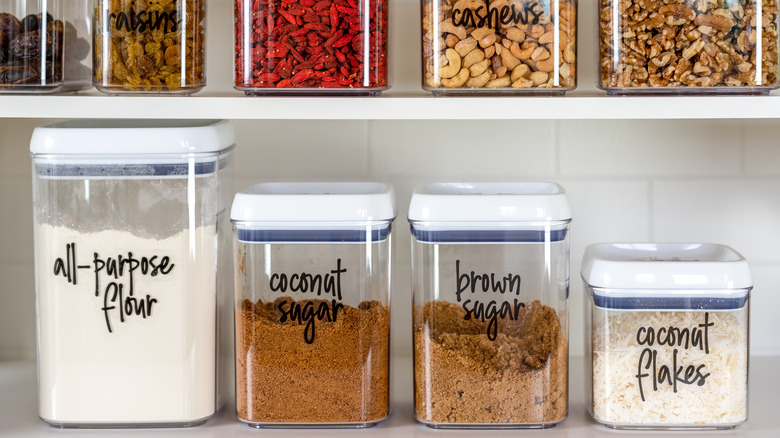Here's Why You Should Always Have Flour In Your Pantry
While the contents of your fridge or pantry will vary depending on the types of dishes you typically cook, there are a few ingredients that you're likely to find in every kitchen, no matter your cooking level. These items can remain in your pantry for quite some time — including non-perishables such as canned goods or dry goods — and can be used in a pinch. They're perfect when you need to create a meal based solely on what you have available, with no extra trips to the store.
Of all the pantry staples to keep on hand, one that tops the list for home cooks and professional chefs is a simple one: flour. As Chef Reina Morris of Buenos Aires Cafe told MSN, "With flour, one can make pasta, pizza, bread, cakes and so many more things to feed your family, making it a great staple." If you're looking to whip up a sweet treat, it's a necessary component for pastries and much more. Even if you need to make a savory meal, flour is the backbone of many carb-packed dishes, as Morris mentioned.
This is the time to clear out your vegetable drawer to create a pasta primavera with homemade pasta or to take a few leftovers from the fridge to whip up a tasty and creative pizza. If you're making breakfast or brunch, flour can be used to create dishes like a delicious stack of pancakes, as MyRecipes suggests.
How to store your flour properly
When working with flour, however, there is a catch: You need to store flour properly. The last thing you want is to grab your flour to whip up an emergency meal only to find that it's gone bad. While you may have thought you could just toss flour into your pantry and forget about it, there are a few storage best practices to keep in mind.
Firstly, toss the paper bag it comes in — you'll want to transfer your flour to an airtight container, as MasterClass suggests. And, while it's trendy to store your pantry staples in glass containers, you actually want to go with a dark container for flour. As AllRecipes reports, light exposure can trigger oxidation, which is one of the main ways that flour can spoil.
Once you have your dark, airtight container to help keep your flour fresh, you'll want to consider where you store it and at what temperature. Though you may not think there's much in the powdery pantry staple, flour does contain some natural oils that can go rancid. To help prevent that, you want to store it in a cool spot. In some climates, room temperature in your pantry is good enough to keep flour fresh for about 12 months, according to The Perfect Loaf. However, in very warm climates, you may want to toss that container in the fridge or freezer to keep the temperature down.

